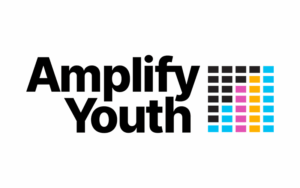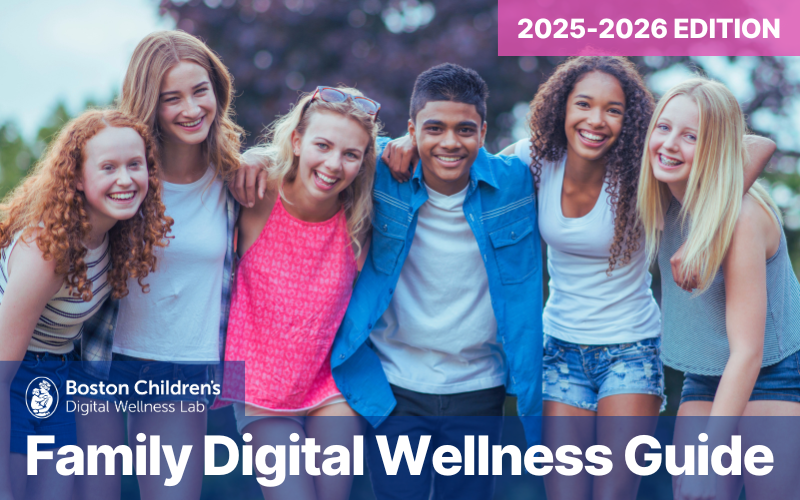Authored by Geo
Member of Digital Wellness Lab 2023-24 Student Advisory Council
Over lunch a few weeks ago, in the midst of conversation, my mom’s eyes abruptly widened, and she grinned. “I saw the funniest video today,” she told me, before describing an Instagram Reel — which she’d since scrolled away from and lost to the current of evanescent clips — in a somewhat concerning level of detail.
“It was of a woman,” she confirmed after I’d asked weeks later, “holding the camera so that you could only see her teenage daughter. The mom goes into her bedroom and starts saying, like, ‘skibidi, rizz, toilet,’ (notably modern online slang terms) and the daughter’s face drops, and she starts to walk away from the mom, and the mom keeps going…”
She spent, maybe, another minute or two describing the video between giggles. The only part she didn’t remember three weeks later was what word came after “fanum,” to which I reflexively answered, “Oh, ‘fanum tax,’ obviously.” I still couldn’t tell you what “fanum tax” means.
Perhaps most striking to me of our conversation, though, was not the unparalleled detail with which my mom could recite a thirty-second-long Instagram Reel, or how inexplicably easy it was to understand the words my mom described; it was, instead, what she’d said jokingly after: “Geo, maybe I should study up, you know, learn some of your teen slang.”
Somehow, with that comment alone, I found myself taken aback. Offended, almost. How dare she, a Generation-X woman whose repertoire of slang should, in my eyes, be confined to “chill pill” and “hip,” offer to learn my slang, understand my words, and — worst of all — use them herself? And while initially, as my mom described the video, I’d found the daughter’s response amusingly exaggerated, I suddenly saw myself as the teenager in that beloved Reel, fleeing from a menacing mother who uttered out-of-place terms I’d only use for irony.
It was, in hindsight, a dramatic reaction, but a hyper-common one nonetheless. Almost any teen exposed to the ceaseless flow of online slang can relate to the deep, innate feeling of embarrassment whenever an adult — be it a parent, relative, even teacher — successfully or unsuccessfully uses our generation’s vocabulary. In fact, it’s become a trend online for parents to “horrify” their children using Gen-Z slang, and my mom’s Reel was just one of the thousands.
In order to understand teens’ instinctive reflex (and finally decide whether adults should be studying up on teen slang), I think we must first understand what slang is, why it exists, and why it spreads and evolves so rapidly.
What is Online Slang?
“Slang”, generally, is a notably contentious, diversely interpreted term that has been around for, give or take, three centuries. At first, it was used — exclusively (a very important word, which I’ll revisit soon) — by “an underworld of thieves, professional beggars, gamblers, and itinerant peddlers and performers” to express deceitful or fraudulent endeavors. More recently though, slang has become a term meaning any vocabulary used by an existing subculture or community.
The key to understanding slang today is realizing its underlying purpose: exclusivity (remember that?). Humans designate themselves into exclusive categories, and we find validation in that exclusivity, the subconscious recognition that we belong in a group where others may not. So, slang use is an indicator of belonging, and, by extension, it’s also a vehicle for exclusion.
More specifically, familiar slang use elicits the in-group favoritism phenomenon, a widely studied sociological bias where people “give preferential treatment to others who belong to the same group that they do.” This has been tested empirically, but even observations about our own life and slang prove it to be true.
Take, for instance, regional identity. Here in Boston, we use terms like “the T”, “storrowed”, and “wicked”, all of which are learned, simply, from the common experiences we face as Bostonians. (Who here hasn’t seen a too-tall truck lodge itself into a bridge on Storrow Drive?) When we hear these terms uttered in spaces outside of Boston, we recognize that the speaker is too a Bostonian, and we feel an immediate sense of shared belonging, an awareness that they bear membership of our “in-group”.
Correspondingly, unfamiliar slang elicits the opposite effect: out-group bias. We’re inclined to develop negative attitudes and discomfort toward people perceived as belonging to groups fundamentally different from our own.
Now, how does modern, online slang’s online-ness change this?
For one, on the internet, we have even fewer indicators of who falls in our group and who does not. In many cases, we cannot see a commenter or content creator’s face (especially on text-central platforms, like Reddit and X). Often, we cannot hear their voice, observe their clothes, or watch their mannerisms. What we can do, most times, is subconsciously analyze their language. If the user includes terms like “adulting” or “mood”, I assume they’re a millennial (and feel somewhat of a bias against them). If they use terms like “cooked” or “glazing”, I assume they’re around my age and place them in my perceived group.
Even more impactful is how online slang spreads like wildfire. With social media’s global interconnectedness, slang has transcended regional boundaries and enabled constant linguistic transactions. If one person says “demure” in a viral video, suddenly everyone in the world does.
Thus, online slang is, a lot of the time, just like a global inside joke. When fashion designer Donatella Versace commented “Donatella VERSACE 💜” on an Instagram post completely unrelated to herself, Gen-Z seized it and began adding capital letters and a purple heart emoji to random phrases, quoting Versace subtly and ironically so that only those familiar with the meme would recognize it. And just like any inside joke, merely understanding it engenders belonging and an affinity toward whoever wrote it.
So, as online slang becomes borderless, age and generation have risen to account for the new major determinants of group identity, which has led to greater generational discourse and, consequently, my mom’s “horrifying children using Gen-Z slang” Reel.
Adults Learning Teen Slang
Now that we know what slang is and why it exists, we can hypothesize why my mom’s original suggestion of learning our slang would make so many teenagers uncomfortable.
Teenagers already know that their parents, relatives and teachers are part of a generational “out-group”; we can see adults’ faces, hear their voices, observe their clothes, watch their mannerisms (and obviously, we know their ages most of the time). But suddenly, when we hear our own vocabulary, our own indicators of belonging exit their mouths, our perceptions of the “in-group/out-group” phenomenon jumble. Slang, which in our minds had otherwise served as an infallible gauge of generational membership, abruptly transitions to utter insignificance. And that is why, I think, our reflexive disgust ensues.
It’s dramatic, I know. But it’s inevitable.
And perhaps that dramatic reaction already answers the question, “should adults learn teen slang?” But if you’re not convinced, I have a couple more reasons why studying up on teenage slang is pretty pointless.
Just like anything exclusive, the more people use slang, the less exclusive it gets. Gen-Z slang is only used by Gen-Z, and when it begins to disperse into other generations’ vocabulary, we start to feel like the slang has lost its Gen-Z identity, turning its sole purpose obsolete. By learning Gen-Z slang, adults contribute to the acceleration of terms’ obsolescence, and by the time they’re done, new terms will already have been made. Now, there is nothing inherently wrong with the cycle of slang, how terms reemerge as quickly as they wither. But the sheer speed of the cycle is a compelling reason to avoid the effort of constantly learning and relearning a generation’s vocabulary.
I’d also be remiss if I didn’t mention how much of today’s slang originates from African American Vernacular English (AAVE), a variety of English with its own grammatical rules and vocabulary. Often, saying AAVE-derived terms without understanding their source can be seen as appropriative or tone-deaf, especially when used incorrectly. African Americans have been routine victims of linguistic prejudice, so before imitating every word we hear on TikTok, we first should acknowledge the word’s history and significance.
A few months ago, I had the opportunity to discuss with some other teens about whether it would be a good idea to create a Gen-Z slang dictionary for parents and teachers to reference. The answer was a pretty unanimous “No.” But some arguments for the other side were made.
The biggest was that teachers and parents do have the responsibility to ensure their students are not in harm. If, suddenly, new Gen-Z slang terms arise with connotations of suicide, drugs, bullying or threats, teachers would realistically want to be aware of them. A recent example was “devious lick”, when middle and high school students would steal school property and post their “devious licks” online.
Ultimately, though, learning slang is — as most things are — up to you. But know that no Gen-Zer is expecting their parents or relatives or teachers to talk to them using language inconsistent with their age or generation. We certainly won’t see you as any worse if you choose to stick with adult vocabulary, and we won’t even see you as worse if you decide to give our slang a try — although, we may cringe momentarily.
The author of this article is a young person who has been engaging with the Digital Wellness Lab about topics of young people’s safety and wellbeing within digital environments. Here at the Lab, we welcome different viewpoints and perspectives. However, the opinions and ideas expressed here do not necessarily represent the views, research, or recommendations of the Digital Wellness Lab, Boston Children’s Hospital, or affiliates.








